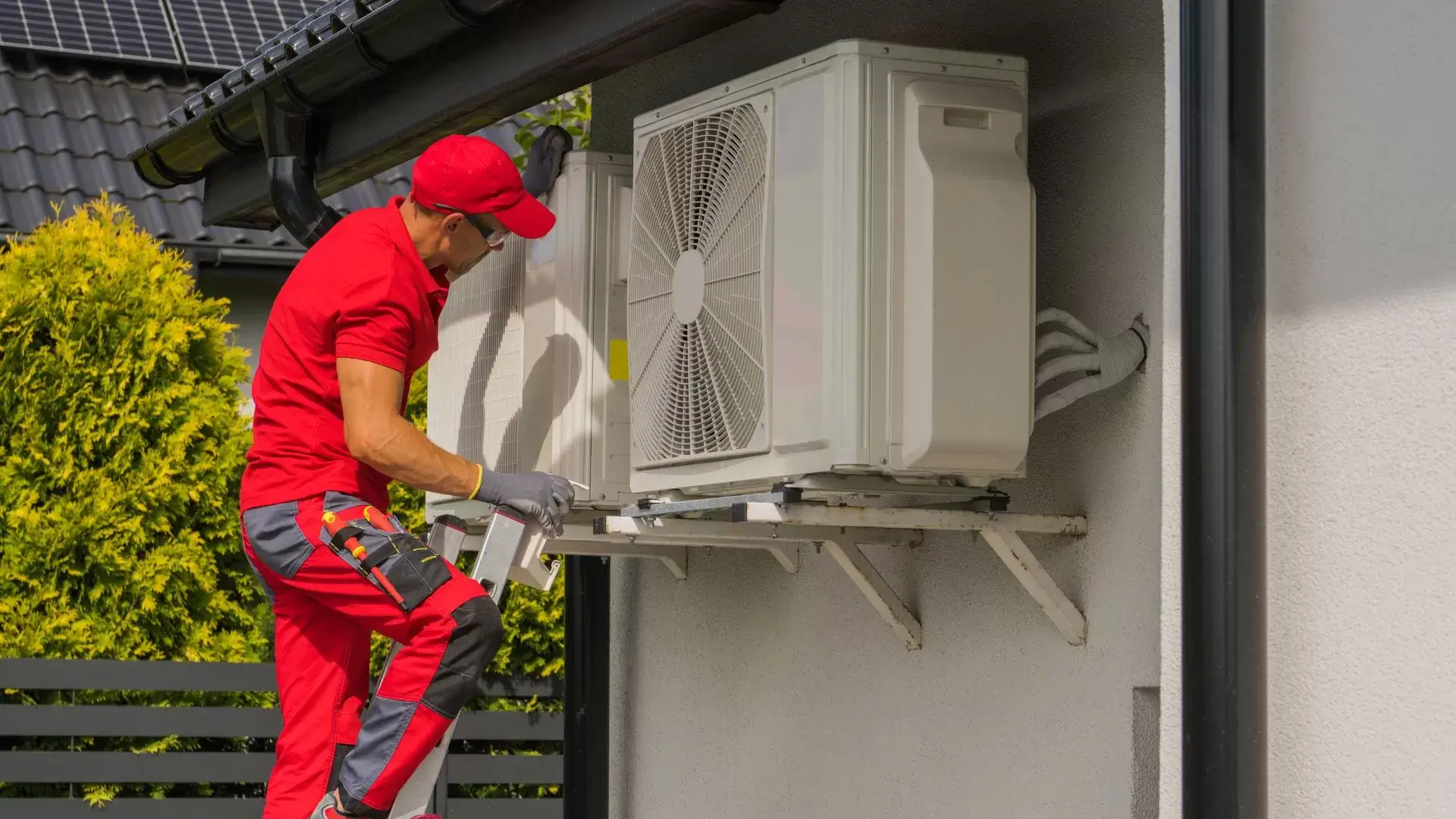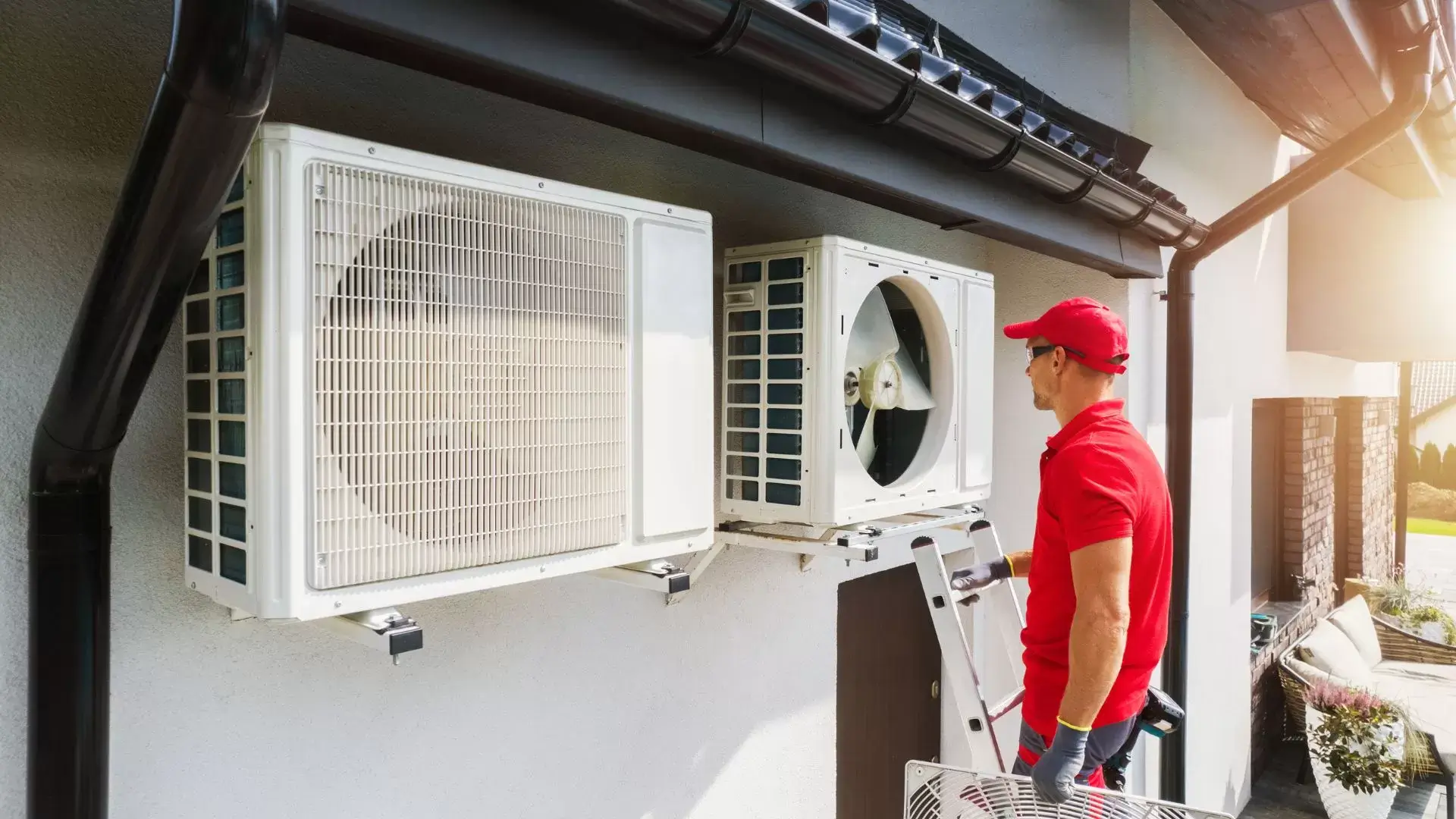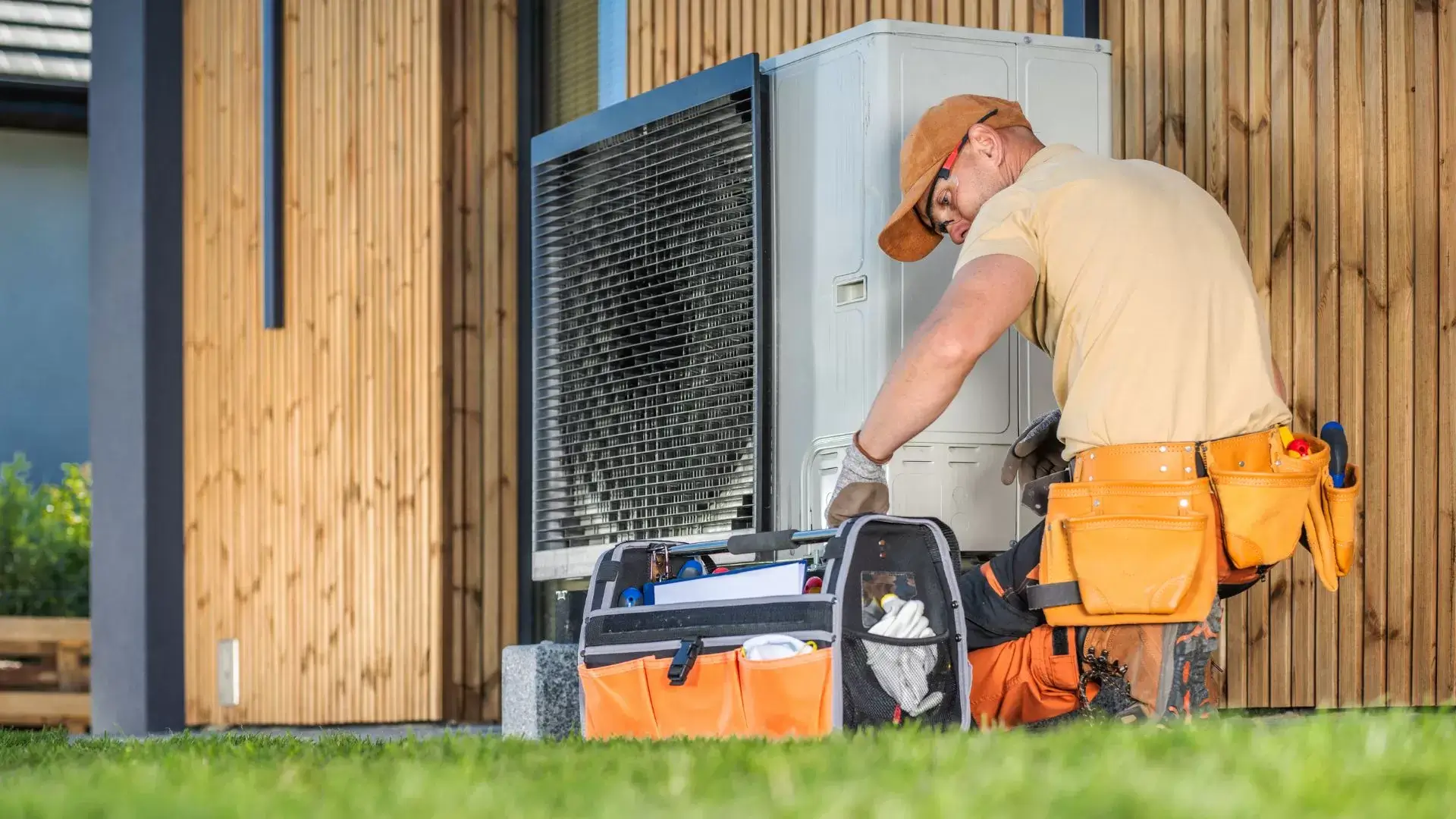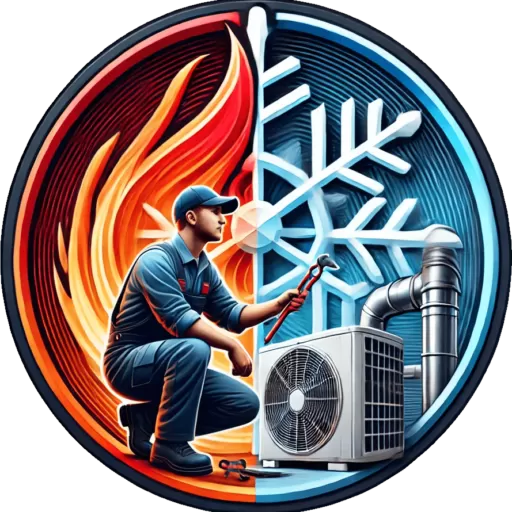Hamilton Heat Pump Installation - Hamilton Furnace and Air Conditioning
At Hamilton Furnace and Air Conditioning, we’re committed to providing professional heat pump installation services tailored to your needs. We recognize the importance of efficient climate control, and we guide you in selecting the right heat pump for your home. Our certified technicians in Hamilton guarantee compliance with local regulations, focusing on ideal performance and energy efficiency. We handle all aspects of the installation process, from site preparation to post-installation support. With a keen emphasis on ongoing maintenance and prompt service, we help keep your system running smoothly. Discover the details of our thorough approach to heat pump solutions.

Understanding Heat Pumps and Their Benefits
Heat pumps are versatile systems that efficiently transfer heat, providing both heating and cooling solutions for our homes and businesses. When we consider heat pump installation, it’s important to understand how an energy-efficient heat pump can enhance our indoor climate control while reducing energy costs. These systems utilize advanced technology to maintain ideal temperatures, making them an excellent choice for both heating and cooling.
To guarantee peak heat pump efficiency, we must conduct a thorough heat pump load calculation. This process determines the appropriate size and capacity of the heat pump for our specific space, leading to improved performance and a longer heat pump lifespan. Additionally, a well-designed heat pump system design can maximize energy usage, further contributing to cost savings.
Regular heat pump maintenance is crucial for sustaining efficiency and prolonging the system’s life. By scheduling professional heat pump installation and routine check-ups, we can prevent potential issues and guarantee our units operate at their best. Proper maintenance not only enhances energy efficiency but also supports consistent climate control throughout the year.
What Is a Heat Pump?
A heat pump is an energy-efficient system designed to transfer thermal energy between indoor and outdoor environments, providing both heating and cooling functionalities. These systems operate by utilizing refrigerants to absorb heat from the air or ground and move it to where it is required. There are several types of heat pumps, including air-source heat pumps, which extract heat from outdoor air, and ground-source heat pumps, commonly known as geothermal heat pumps, which leverage the stable temperature of the earth.
Mini-split heat pumps are another popular option, offering flexibility for zoning in specific areas of a home. For those looking for enhanced performance, dual-fuel heat pumps combine a traditional heating system with a heat pump, maximizing energy usage based on outdoor temperatures.
When considering installation, it is crucial to evaluate the heat pump efficiency rating, as this metric indicates how effectively the unit converts energy into heating or cooling. High-efficiency heat pumps can lead to substantial heat pump energy savings over time, making them a cost-effective choice in the long run.
While the upfront heat pump installation cost may be higher than traditional systems, the long-term benefits, including reduced energy bills and improved comfort, often justify this investment. Understanding the various types of heat pumps and their unique advantages enables us to make informed decisions for ideal home heating and cooling solutions.

Different Types of Heat Pumps
When selecting a heat pump, understanding the different types available is crucial. The three most common types include:
- Air-Source Heat Pumps – These are the most common types of heat pumps and work by transferring heat between your home and the outside air. They are ideal for moderate climates and can still operate efficiently in cold temperatures.
- Ground-Source (Geothermal) Heat Pumps – These systems extract heat from the ground and are highly efficient but require a more extensive installation process. They provide long-term savings and are a sustainable choice.
- Water-Source Heat Pumps – These units use a nearby water source to regulate temperature. They are less common but are effective in specific locations where water access is available.
Choosing the Right Heat Pump for Your Home
When selecting the right heat pump for our home, we should consider factors such as climate, energy efficiency, and specific heating and cooling needs. Proper heat pump sizing is essential to guarantee peak performance; an undersized unit won’t effectively heat or cool our space, while an oversized one may lead to inefficiencies and increased wear. We must also evaluate heat pump compatibility with our existing systems, especially if we’re considering a heat pump replacement for our current furnace.
For those of us using a heat pump with a gas furnace or a heat pump with electric backup, understanding how these systems interact can influence our choice. Additionally, we should look into variable speed heat pumps, which offer enhanced efficiency and comfort by adjusting their output based on current conditions.
Air quality and humidity control are also important factors. A heat pump that supports advanced air filtration can greatly improve indoor air quality, while features like a heat pump zoning system can help us manage temperature and humidity levels in different areas of our home more effectively.
Ultimately, we should prioritize energy efficiency ratings and consider how our chosen heat pump will integrate with our lifestyle and home design. By taking the time to assess these aspects, we can guarantee our heat pump installation meets our long-term needs for comfort, efficiency, and air quality.
Factors to Consider
Selecting the right heat pump requires considering various factors such as:
- Home Size and Layout – Larger homes may need more powerful units or multiple-zone systems.
- Climate Conditions in Hamilton – Ensure the selected heat pump operates efficiently in both hot and cold seasons.
- Energy Efficiency Ratings – Look for high SEER (Seasonal Energy Efficiency Ratio) and HSPF (Heating Seasonal Performance Factor) ratings for optimal energy savings.
- Budget and Financing Options – Initial costs versus long-term savings should be taken into account.
Preparing for Heat Pump Installation
Before installation, we must confirm that our home is adequately prepared to accommodate the new heat pump system. Proper preparation is vital for a smooth heat pump installation and peak performance. First, we should schedule a heat pump professional assessment to evaluate our home’s layout and insulation. This assessment will inform us about the necessary heat pump ductwork adjustments and ascertain that our home comfort needs are met.
Next, we need to check for any required heat pump permits in our area. Compliance with local regulations is essential to avoid complications during and after installation. Additionally, we must prepare the installation sites for both the heat pump indoor unit and outdoor unit. This includes verifying that there is adequate space, proper ventilation, and a stable foundation for the outdoor unit.
We should also consider the electrical requirements. Heat pump wiring must be in place and up to code to handle the unit’s power demands. Confirming that our electrical system can support the new heat pump will prevent issues down the line.
Tips to Prepare for A Heat Pump Installation
To ensure a smooth installation, follow these preparation steps:
- Evaluate Your Current HVAC System – Identify if modifications are needed to integrate the new heat pump.
- Check Your Home’s Insulation – Proper insulation ensures maximum efficiency.
- Choose a Suitable Location – The outdoor unit should have adequate airflow and be free from obstructions.
- Schedule a Professional Consultation – A certified technician can assess your home and recommend the best options.
Step-by-Step Heat Pump Installation
- Site Assessment – A technician will evaluate the best placement for both the indoor and outdoor units.
- Preparing the Area – Clearing any obstructions and ensuring proper wiring and connections.
- Mounting the Indoor Unit – Installed in a central location for optimal airflow.
- Installing the Outdoor Unit – Placed in a well-ventilated area away from debris.
- Connecting Refrigerant Lines – Ensuring a secure and leak-free connection.
- Electrical Setup – The unit is wired into your home’s power system.
- Testing and Calibration – The system is run and tested for proper operation.

Why Choose Professional Installation?
Choosing professional installation for our heat pump not only affirms compliance with local regulations but also guarantees that the system operates efficiently and effectively, maximizing our investment. When we opt for professional heat pump installation, we make certain that all necessary protocols are meticulously followed, from heat pump commissioning to heat pump duct sealing. This thorough approach minimizes potential issues and enhances overall performance.
Once installed, we benefit from rigorous heat pump testing, confirming that our system is configured correctly to provide the best heating in winter and cooling in summer. Professionals are equipped to address any heat pump troubleshooting that might arise, making sure our system runs smoothly throughout its lifespan. Additionally, having a heat pump service agreement in place provides us peace of mind, knowing that regular maintenance and any necessary repairs are managed by experts.
In the event of unforeseen issues, we can rely on heat pump emergency service, allowing us to return to comfort quickly. By investing in residential heat pump installation carried out by trained professionals, we not only protect our investment but also make certain that our heat pump operates at peak efficiency.
The Advantages of Professional Installation
While DIY installation may seem cost-effective, hiring a professional offers numerous benefits:
Expertise and Accuracy – Avoid common installation mistakes that could lead to inefficiencies or safety hazards.
- Compliance with Local Codes – Professional installers ensure adherence to Hamilton’s HVAC regulations.
- Warranty Protection – Many manufacturers require professional installation to validate warranties.
- Long-Term Savings – Proper installation ensures optimal performance and reduces future repair costs.
Choosing the Right HVAC Contractor
Selecting the right HVAC contractor is vital for guaranteeing that our heat pump installation is executed with precision and adheres to industry standards. When we consider a contractor, we should evaluate their experience with both ductless and central heat pump systems, as different installations may require specific expertise. A qualified contractor will assess our needs and recommend the best options for heat pump installation or upgrades tailored to our unique circumstances.
It’s important to verify that the contractor is licensed and insured, as this protects us from potential liabilities during the installation process. We should also inquire about their experience with heat pump repair and maintenance services. An effective HVAC contractor will provide ongoing support, including heat pump tune-ups and troubleshooting for issues such as heat pump thermostat malfunctions or airflow optimization.
For those of us considering commercial heat pump installations, we must confirm that the contractor has experience in that area, as commercial systems often differ greatly from residential ones. Another vital aspect is the contractor’s approach to heat pump insulation. Proper insulation not only enhances efficiency but also contributes to long-term savings.

Selecting The Right HVAC Contractor
Identifying a qualified HVAC contractor is vital for guaranteeing our heat pump installation meets all technical requirements and delivers peak performance. When selecting a contractor, we should prioritize their experience with heat pump systems, specifically their proficiency in handling heat pump compressors and air handlers. A well-versed contractor will conduct thorough heat pump refrigerant lines assessments and guarantee the correct installation of heat pump ductwork, which is essential for efficient operation.
Additionally, it’s important to verify that the contractor offers services such as heat pump ventilation and noise reduction techniques. Effective ventilation minimizes operational sounds, while noise reduction strategies enhance our overall comfort. We should also inquire about their approach to heat pump filter replacement, as regular maintenance is key to prolonging the lifespan of our system.
Moreover, we can benefit from understanding the financing options available for heat pump installation. A good contractor will provide transparent information regarding heat pump financing, helping us make informed decisions that fit our budget.
Lastly, if we’re interested in modernizing our system, we should ask about smart thermostat installation capabilities. These devices optimize energy usage and can greatly improve the efficiency of our heat pump. By carefully evaluating these factors, we can select a reliable HVAC contractor who will guarantee a successful heat pump installation, tailored to meet our specific heating and cooling needs.
Regulations for Heat Pump Installation in Hamilton
Understanding the regulations governing heat pump installation in Hamilton is vital to guarantee compliance and ideal performance of our HVAC systems. We must be aware of local codes that pertain to the installation of heat pumps, including requirements for heat pump refrigerant types, as these can affect efficiency and environmental impact.
The heat pump condenser, evaporator coil, and heat exchanger must be properly installed to guarantee optimal operation. Regulations often dictate the necessary clearances around these components to facilitate efficient airflow and heat transfer. Additionally, compliance with specifications related to the heat pump defrost cycle is essential for maintaining performance during colder months, especially in regions that experience extreme temperatures.
We should also pay attention to guidelines surrounding heat pump cold climate performance, particularly when selecting units for our homes. Proper installation of the heat pump drain line is vital to prevent water accumulation and potential damage.
Thermostat calibration is another important aspect, guaranteeing accurate temperature readings and efficient system operation. Moreover, we can take advantage of heat pump rebate programs that may be available, providing financial incentives for energy-efficient installations.
Lastly, incorporating air purification features into our heat pump systems can enhance indoor air quality, aligning with health and safety regulations. By adhering to these regulations, not only do we guarantee compliance, but we also enhance the longevity and efficiency of our heat pump systems, providing comfort and savings for years to come.
Local Guidelines and Compliance
Hamilton has specific regulations for heat pump installation, including:
- Building Permits – Required for certain installations.
- Energy Efficiency Standards – Must meet provincial energy guidelines.
- Noise Restrictions – Placement of outdoor units must comply with city ordinances.
Post-Installation Support
Post-installation support is essential for guaranteeing our heat pump systems operate efficiently and effectively throughout their lifespan. At Hamilton Furnace and Air Conditioning, we recognize that the installation process is just the beginning of our relationship with our clients. Our commitment to providing thorough post-installation support guarantees that we’re there for you long after the installation is complete.
We offer a range of resources designed to enhance your experience and maximize the performance of your heat pump. First, we provide detailed operational manuals and guidelines tailored to the specific model installed in your home. These resources help you grasp the features and functions of your system, enabling you to utilize it effectively.
Additionally, regular follow-up consultations are part of our support package. These consultations allow us to assess your heat pump’s performance and address any concerns you may have. We believe in proactive communication, guaranteeing you’re informed about best practices for operating your system efficiently.
Moreover, we’re always just a phone call away for any questions or troubleshooting needs. Our knowledgeable team is dedicated to providing prompt assistance, helping you resolve issues swiftly to minimize downtime.
Repair and Maintenance Services
To guarantee your heat pump continues to operate at peak efficiency, regular repair and maintenance services are integral to its long-term performance. We recognize that a well-maintained heat pump not only improves comfort but also reduces energy costs and extends the lifespan of the unit.
Our maintenance services include thorough inspections of essential components such as the compressor, evaporator coil, and condenser. We’ll check refrigerant levels, tighten electrical connections, and verify the thermostat is calibrated correctly. By identifying potential issues before they escalate, we can help avoid costly repairs down the line.
Additionally, we recommend routine cleaning of the filters, which is crucial for ideal airflow and efficiency. Clogged filters can reduce system performance and lead to increased energy consumption. We’ll also make sure the outdoor unit is free from debris, allowing for proper air circulation.
In case of unexpected breakdowns, our repair services are prompt and efficient. Our skilled technicians are trained to diagnose and fix a variety of issues, ensuring minimal downtime and maximum comfort for your home. We utilize high-quality replacement parts that meet industry standards, guaranteeing reliability and performance.
Troubleshooting Issues After Installation
If you encounter issues post-installation, common problems may include:
- Insufficient Heating or Cooling – Check thermostat settings and filters.
- Unusual Noises – Could indicate loose parts or debris.
- High Energy Bills – Possible inefficiency or system leakages.
Frequently Asked Questions (FAQs) – Heat Pump Installation Near Me
How Long Does a Heat Pump Installation Typically Take?
When it comes to heat pump installation, we often find that the process typically takes anywhere from one to three days, depending on several factors. These factors include the complexity of the system, existing ductwork, and site conditions. We guarantee a thorough assessment beforehand, so we can streamline the installation and minimize disruption. Ultimately, our goal is to provide efficient service while guaranteeing peak performance of the heat pump system.
What Is the Cost Range for Heat Pump Installation in Hamilton?
When considering heat pump installation costs, we typically see a range from $3,000 to $8,000, depending on factors like the unit’s efficiency, size, and complexity of the installation. It’s crucial to account for any additional expenses, such as ductwork or electrical upgrades. We recommend obtaining multiple quotes to guarantee we’re getting the best value and quality service. Ultimately, the investment can lead to significant energy savings over time.
Are There Any Local Rebates for Installing Heat Pumps?
When it comes to installing heat pumps, we’ve found that local rebates can greatly offset costs. Various programs are often available through municipal or provincial initiatives aimed at promoting energy efficiency. We should check with local energy providers or government websites to see what specific rebates we might qualify for. These incentives not only help reduce upfront expenses but also encourage us to make environmentally friendly choices for our homes.
Can I Install a Heat Pump Myself?
Installing a heat pump ourselves isn’t always advisable. While it may seem doable, these systems require precise knowledge of electrical work, refrigerant handling, and local codes. Mistakes can lead to inefficiency or safety hazards. We should consider hiring a professional for installation to guarantee peak performance and compliance with regulations. Plus, a certified installation often comes with warranties that protect our investment and provide peace of mind.
What Should I Do if My Heat Pump Is Not Working?
If our heat pump’s not working, we should first check the thermostat settings to guarantee it’s set correctly. Next, we can inspect the air filters and clean or replace them if they’re dirty. It’s also wise to examine the outdoor unit for any debris blocking airflow. If these steps don’t resolve the issue, we might need to consult a professional to diagnose potential electrical or mechanical problems within the system.
Contact Hamilton Furnace and Air Conditioning for Your Heat Pump Needs
For professional heat pump installation in Hamilton, trust Hamilton Furnace and Air Conditioning. Our certified technicians ensure high-quality installation and long-term reliability. Contact us today for a free estimate and expert consultation!
